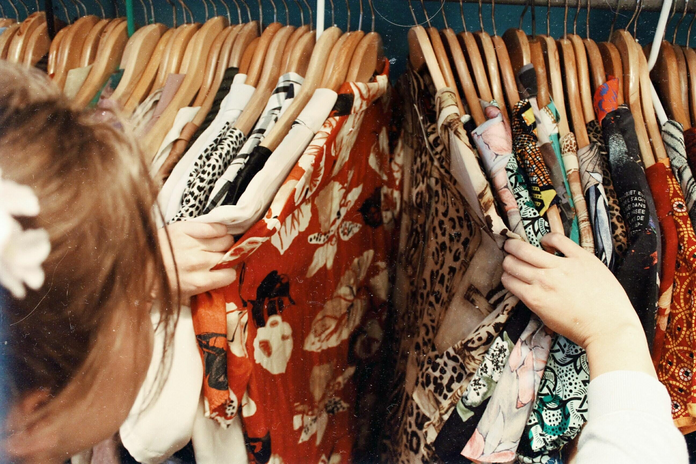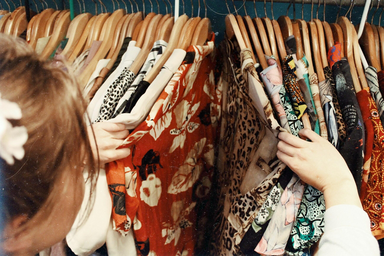Recently, sustainable fashion has become a hot topic of conversation as a response to the awareness people have slowly gained from the environmental harm fast fashion brings to the world. Business Insider explains that at least 10% of all carbon emissions are caused by the fashion industry. Some of the many ways this industry destroys our world include water pollution, scarcity of water and other natural resources, and accumulation of waste.
According to Conscious Life & Style, sustainable fashion refers to clothes that are produced and/or accessed in an ecologically and socially responsible manner. There are many things that make sustainable fashion a great option, like its consideration for the environment, for animals and for the garment workers that produce the garments. Despite all the positive things sustainable fashion stands for and provides to consumers, this particular shopping lifestyle is not possible for everyone. This is an important conversation to have because many followers of this conscious movement have continuously judged and shamed people who can’t afford sustainable fashion products without really understanding why.
Not everyone can afford sustainably-made garments
Sustainable fashion is a privilege not many can afford. According to the census, the median household income in the United States is $62,843; which, depending on where in the United States you live, on how many people you have to maintain and how many bills you have to pay, is not nearly enough to buy sustainable fashion goods without breaking the bank. Most of the time, sustainable clothes are considerably pricier than fast fashion products, making them less accessible to those who don’t have the extra money.
But what about thrift stores and reselling apps like Depop or Poshmark? The sudden popularization and gentrification of these reselling options has made it almost impossible to find clothes that are fashionable or reasonably priced considering they are second hand garmentsーshout out to those re-sellers that put up Urban Outfitters clothes on Depop, call them vintage and then charge double or even triple the original price. For some households, getting food into their bodies and having a roof over their heads is more important than buying an $80 basic shirt. Taking all of this into consideration, isn’t it understandable that some people simply don’t want to go broke for buying a pair of jeans that are ethically made?
Most sustainable fashion brands are not size inclusive
As stated in an article by The Sensible Fay, there’s a problem with the fashion industry being fatphobic overall. The article further explains that this industry doesn’t just sell clothes, they sell the fantasy of being the perfect woman with the perfect lifestyle; and, according to this rhetoric, being fat doesn’t fall into this fantasy. The average size of an American woman is between 16 to 18. Finding sustainably made garments in these sizes isn’t easy, considering the fact that not even fast fashion seems to get the memo that plus sized women also wear fashionable clothes. Both fast fashion and sustainable fashion brands claim that the production costs of opening up their sizing to larger women would be too expensive, which is false. You know what’s really expensive? Having a wide range of sizes on a store catalog, but not having any plus sizes available. Considering that 68% of shoppers are a size 14 or more, wouldn’t they make higher profits by being size inclusive?
We have to remember that women who are plus sized or just considered larger get paid substantially less than skinny women, and yet brands that do have larger sizes available have prices that most people can’t afford. The fact is that the fashion industry as a whole is not size inclusive, including the realm of sustainable fashion. This makes it harder for larger women to be able to find clothes that are their size, let alone ones that are also ethically made.
It’s not an individual problem, but a systematic one
People who practice sustainability try to shame others into implementing this lifestyle; but, at the end of the day, sustainability is not something that can be reached individually. Instead, true sustainability can only be achieved by practicing systematic change. As much as we like to believe that we can help the world by buying ethically-made clothes or purchasing second-hand items, the big companies continue doing damage that can’t be off-set or resolved by individuals’ single purchases.
The world is slowly deteriorating and we need to make some sacrifices to try to salvage it. However, shaming people into buying sustainable items is not the answer to our problem. Some people are not able to afford or find items in their sizes that are sustainably-made, and that’s totally OK. Remember that there’s no reason to shame them for a problem created by the fashion industry. The change needs to come by making companies modify their ways of production and by demanding better pay for everyone. Perhaps more people will be able to make the switch to sustainable clothing once that happens.


